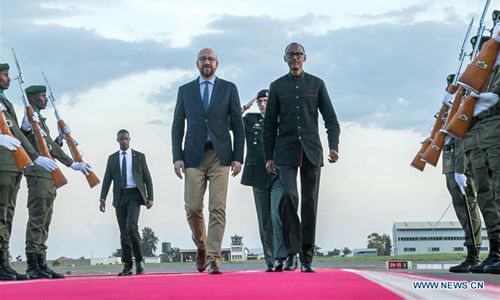
Rwandan President Paul Kagame (C-R) receives Belgian Prime Minister Charles Michel (C-L) in Kigali, capital of Rwanda, on April 6, 2019. Michel arrived in Kigali for the commemoration of the 25th anniversary of the 1994 Rwandan genocide. (Photo:Xinhua)
A Paris appeals court ruled Wednesday that Rwandan genocide suspect Felicien Kabuga, arrested in France after evading police in several countries for 25 years, should be handed over to a United Nations (UN) tribunal in Tanzania to stand trial.Accused of financing the 1994 genocide of some 800,000 people, Kabuga had asked for a trial in France, citing frail health and claiming the UN court in Africa would be biased against him, and possibly hand him over to Rwandan authorities.
His transfer still faces a final hurdle with defense lawyers planning to appeal the ruling at France's highest court of appeal.
He attended the hearing in a wheelchair and barely reacted when the decision was read out.
A lawyer for the 84-year-old Kabuga said he would appeal the decision to hand him over to the Mechanism for International Criminal Tribunals (MICT), which is based in The Hague but has a branch in Arusha, Tanzania.
"I was expecting this, because it's a highly politicized case," said one of his lawyers, Laurent Bayon.
"A transfer to Arusha, and the detention conditions there, would not allow him to survive, so a full trial would not be possible, neither for him nor the victims," he said.
If the appeal is accepted by France's court of cassation, a decision would be issued within two months. If it endorses his transfer, he would have one month to appear before the international court.
Described as Africa's most wanted man, Kabuga was arrested on May 16 at his home outside Paris, where he had been living under a false name.
A judge in The Hague ruled in May, however, that Kabuga should be tried in Arusha by the MICT, which took over the duties of the UN's International Criminal Tribunal for Rwanda when it formally closed in 2015.
Kabuga, once one of Rwanda's richest men, was indicted by the tribunal in 1997 on seven counts, including genocide.
He is accused of forming the notorious Interahamwe militia that carried out massacres, and the Radio-Television Libre des Mille Collines, whose broadcasts incited people to murder.
Hundreds of thousands of Tutsis but also moderate Hutus were slaughtered over 100 days of ethnic violence committed by Hutu extremists in 1994.
AFP
